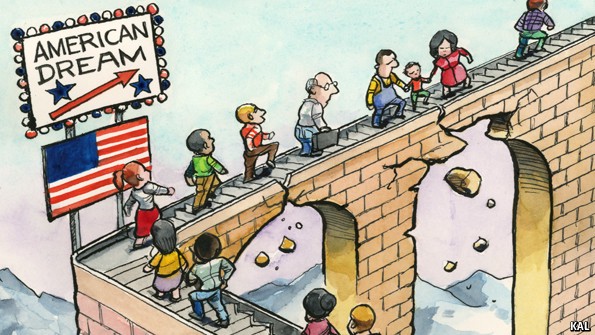If you’re born in the United States, having wealthy parents matters a great deal to your chances of success, according to a new report.
Individuals born into poorer families have a better chance of owning a home, getting a good education and experiencing a better life than their parents if they are born in Canada than if they are born in the United States. In other words, Canadians have a better shot at the American Dream than Americans do.
That’s according to the World Economic Forum’s Global Social Mobility Index, which ranks 82 countries on their citizens’ ability to fulfill their potential regardless of their socio-economic background.
The report was published Monday to coincide with the start of the World Economic Forum in Davos, Switzerland, where global income inequality is a recurring theme.
The index ranks economies across five dimensions: health, education, technology access, work (in terms of opportunities, conditions and fair wages), and protection and institutions.
Germany is the most socially mobile country among the G7, ranking 11th overall, followed by France (12th), Canada (14th), Japan (15th), the United Kingdom (21st), the United States (27th) and Italy (34th).
Nordic countries, including Denmark, Finland, Norway, Sweden and Iceland, have the best social mobility scores.
Among the world’s large emerging economies, Russia ranks 39th, followed by China (45th), Brazil (60th), India (76th) and South Africa (77th).
“The headline finding of the report is that most economies are failing to provide the conditions in which their citizens can thrive, often by a large margin,” the World Economic Forum said in a statement Monday.
“As a result, an individual’s opportunities in life remain tethered to their socio-economic status at birth, entrenching historical inequalities,” the statement added.
Wealthy parents
As it stands right now, in the United States, it takesfive generations for a low-income family to reach median income, but that number could change. This statistic is better than it is inGermany and France, but worse than it is in Canada, Australia and Denmark, which has the best social mobility score overall.
In Denmark, a child born into poverty has a similar likelihood of earning a high income in adulthood as a child born into a rich family, according to the report. This is thanks to a combination of widespread access to high quality education, good work opportunities and conditions, and a robust social safety net.
Germany and France rank much better than the United States on social protection and have fairer wages, which lifts those countries’overall social mobility ranking.
The report finds that wage disparities have grown “exponentially” since the 1970s. The top 1% of income earners in the United States earned 158% more in 2018 than they did in 1979,while the bottom 90% of earnersin the USgrew their wages just 24% over that timeperiod.
Coming from a wealthy family has other benefits, too. Citing data gathered by IPSOS on behalf of LinkedIn, the report notes that Americans who grew up in a high income household are three times more likely to report having strong social and professional networks than those who grew up in a low income household.
“This means those individuals experience a double advantage in both social and financial capital,” the report said.
Fixing inequality
Governments should implement policies to address wealth concentration, such as making personal income tax more progressive and rebalancing the sources of taxation, according to the report.
It also recommends improving the quality of education and promoting skills development throughout an individual’s working life. Helping workers to transition into different types jobs in the context of technological change is a further proposal.
Businesses should hire based on merit while paying fair wages and investing in upskilling their employees, the report said.
Inequality weakens a country’s social fabric and erodes trust in institutions, according to Klaus Scwhab, the founder and executive chairman of the World Economic Forum.
“The response by business and government must include a concerted effort to create new pathways to socioeconomic mobility, ensuring everyone has fair opportunities for success,” Schwab said in a statement.
AFP

